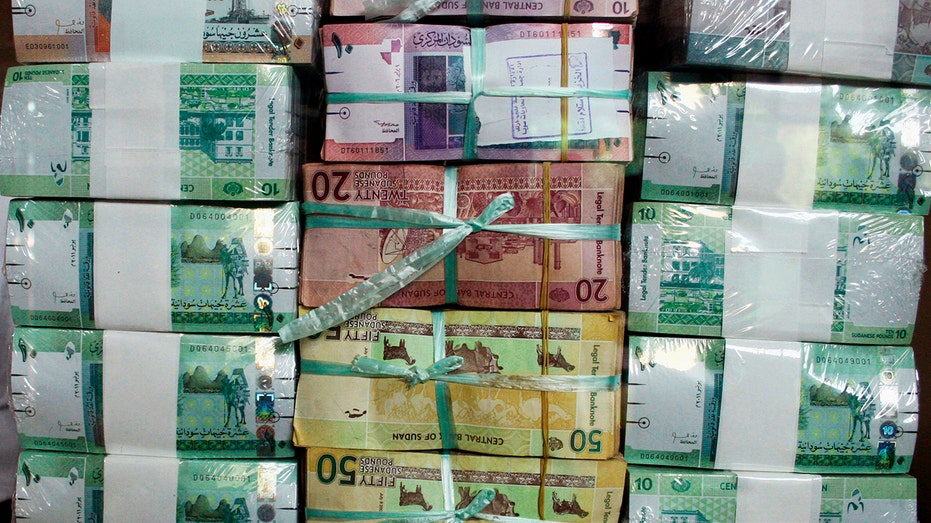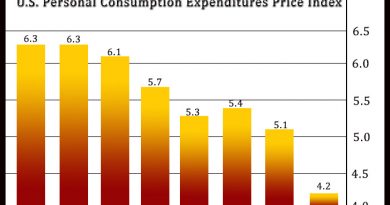Sudan announces currency devaluation to meet major international financial institution demand
Fox Business Flash top headlines for February 19
Fox Business Flash top headlines are here. Check out what’s clicking on FoxBusiness.com.
CAIRO – Sudan announced a managed flotation of its currency on Sunday, in an unprecedented but expected step to meet a major demand by international financial institutions to help transitional authorities overhaul the battered economy.
The move is the boldest economic measure taken by the joint military-civilian government that has ruled the African country after a popular uprising. The revolt led to the military’s overthrow of autocrat Omar al-Bashir in April 2019. The country has since been on a fragile path to democracy with daunting economic challenges representing a major threat to that transition.
The sharp devaluation could provoke a popular backlash as the price of goods and services rise in response to the fall of the pound’s value and possible hike in the price of fuel and other essential goods. There were already sporadic protests over dire living conditions in the past couple of weeks in the capital, Khartoum and other parts of the country.
CLICK HERE TO READ MORE ON FOX BUSINESS
The U.S. dollar had been trading at over 350 pounds to the dollar on the black market, while its official rate was at 55 pounds to the dollar. Following the devaluation, local media reported banks were selling the dollar at an average of 375 pounds, and buying the U.S. currency for an average of 390, in an attempt to attract those trading in the unofficial currency market.
Sudan’s currency will now fluctuate according to supply and demand and the the Central Bank of Sudan said it will announce a daily flexible indicative rate in a “flexible managed float” that banks and other exchange bureaus are required to trade at within 5% above or below.
The managed floating system, that took effect Sunday, gives the central bank the option to set a rate based on the trading average, Al-Fatih Zayed al-Abidin, the central bank governor said in a news conference in Khartoum along with Finance Minister Gibril Ibrahim.
The move was part of measures the transitional government has embarked on in recent months to transform the country's economy and rejoin the international community after over two decades of isolation.
Sudan announced a managed flotation of its currency on Sunday, in an unprecedented but expected step to meet a major demand by international financial institutions to help transitional authorities overhaul the battered economy. (AP Photo/Abd Raouf, F The Central Bank said its decision would help “normalization of ties with international and regional financial institutions and friendly countries to ensure the flow of grants and loans” into Sudan's economy. “Our economy is in a situation that cannot be addressed without making such a decision,” Ibrahim said. "It is in our interest, in the interest of the country, and in the interest of the citizen.” Western governments welcomed the decision to liberate the exchange rate. The U.S. Embassy in Khartoum welcomed the “courageous” move, saying it paves the way for debt relief and significantly increases the impact of international assistance. “This decision will also help Sudanese companies and attract international investment as both local and foreign companies will no longer encounter difficulties doing business in Sudan because of the dual exchange rate,” it said. Volker Perthes, the U.N. envoy for Sudan, also hailed the floatation, saying, “It demonstrates that the transitional authorities can reach consensus, take difficult decisions and carry them through.” The move was a key demand by the International Monetary Fund. Sudan should conclude a 12-month Staff Monitoring Program with the IMF to win relief on its foreign debt, which is at $70 billion. That program is set to end in September. Sunday's move came after Prime Minister Abdalla Hamdok announced a Cabinet reshuffle to add rebel ministers. The reshuffle was part of a deal the transitional government struck last year with a rebel alliance. Sudan has for years struggled with an array of economic woes, including a huge budget deficit and widespread shortages of essential goods and soaring prices of bread and other staples. The country's annual inflation soared past 300% last month, one of the world's highest rates. GET FOX BUSINESS ON THE GO BY CLICKING HERE The country was plunged into an economic crisis when the oil-rich south seceded in 2011 after decades of war, taking with it more than half of public revenues and 95% of exports. Sudan was also an international pariah after it was placed on the United States’ list of state sponsors of terror early in the 1990s. This largely excluded the country from the global economy and prevented it from receiving loans from international institutions like the IMF. Former President Donald Trump removed Sudan from the blacklist after the transitional government agreed to pay $335 million in compensation for victims of attacks carried out by Osama bin Laden’s al-Qaida network while the terror leader was living in Sudan. The removal also was an incentive for Sudan to normalize ties with Israel. Source: Read Full Article



